
|
Seven Samurai (1954, Jp.)
(aka Shichinin no samurai)
In Akira Kurosawa's epic dramatic masterpiece set
in the year 1586 - and later used as a template for the western The
Magnificent Seven (1960), it was about a Japanese peasant village
protected from roving hordes of bandits by seven unemployed, recruited
samurai or ronin (swordsmen), who were compensated with three meals
of rice a day and lodging:
- the 16th century epic plot was set during the Sengoku
Period, a lawless time of civil wars when farmers were at the mercy
of ferocious brigands of bandits, who galloped on horses across
the screen in the film's opening; a Bandit Chieftain (Shinpei Takagi)
and his second-in-command captain (Shin Ôtomo) peered
down from a high-angle on a mountain village but decided not to
ravage it once again for its rice and barley, until after the harvest
came in: ("We just took their rice last fall. They'll have
nothing now"); in
the village, the peasants moaned and cried out:
"Is there no god to protect us? Land tax, forced labor, war,
drought, and now bandits! The gods want us farmers dead!"
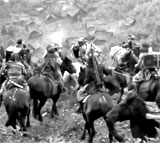
|
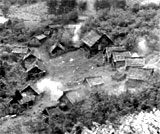
|
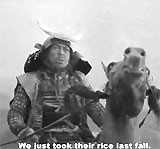
|
|
Hordes of Bandits Roaming the Countryside and Considering
Attacking a Village
|
- the villagers discussed what they might do in the
future: Should they surrender their harvest to the bandits, or
fight back against them?; a young farmer Rikichi (Yoshio Tsuchiya)
strongly suggested that the villagers should fight back and not
bargain with the bandits - "Kill or be killed,"
but an older farmer named Manzo (Kamatari Fujiwara)
disagreed - he recommended for them to submit to the bandits: "The
farmer's only choice is to endure. We can't defy the powerful.
When the bandits arrive, we'll greet them meekly and quietly hand
over all our barley. We'll plead with them to leave just enough
for us to survive"
- the villagers decided to seek the advice of
the village's elder-patriarch Gisaku (Kokuten Kôdô)
who lived in an old mill; he advised briskly: "We fight...We'll
hire samurai"; some were troubled and questioned: "Whoever heard of farmers
hiring samurai?," especially samurai who were known to be proud; the elder responded that the
villagers should hire those who were unemployed or hungry: "Find
hungry samurai. Even bears come down from the mountains when they're
hungry"
- in the nearby town, three villagers' initial efforts
over a ten-day period to directly hire samurai were frustrating
and unsuccessful, since most possible candidates refused what they
called "charity" for
only three meals a day, and some were unsuited and weak; but then
some of the villagers witnessed the cunning rescue of a young 7
year-old male hostage from a thief that changed everything
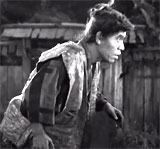
|
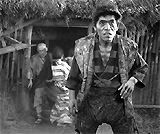
|
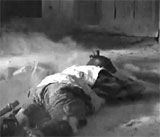
|
|
Kambei's Killing of Thief with Child Hostage
|
- in a powerful sequence, wise veteran leader ronin
(samurai warrior) Kambei Shimada (Takashi Shimura) disguised
himself as a monk (his head was shaved and he was dressed in a
monk's robe) to rescue the child hostage held in the town's barn-hut
by a kidnapper-thief (Eijirô Tôno); he calmed the
kidnapper: ("I'm just a monk, I mean you no harm") and offered food (two rice-balls)
to feed the man and upset child; but then, in an intercut edited
sequence with various crowd reaction shots while wielding a sword
inside the hut, Kambei killed the man who ran out of the hut and
fell face-forward dead (in slow-motion)
- Kambei's rescue brought forth a wealthy, idealistic,
and immature young nobleman named Katsushiro Okamoto (Isao Kimura),
who eagerly begged to be Kambei's disciple-acolyte; Kambei at first
refused ("There's nothing special about me"), but Katsushiro was
insistent that he wanted to tag-along: ("I'm
determined to follow you whether you allow me to or not")
- when the farmers asked Kambei (and Katsushiro)
to help defend their village, Kambei asserted: "This isn't a game";
Kambei speculated that "defense
is more difficult than offense"- and that he would need to recruit
four more masterless samurai warriors (seven in total, including
himself); he theorized that at least four men would be needed to
guard each side of the entire village, and two more would be needed
to help guard the rear (up against the mountains)
- Kambei accepted their offer to take up the "cause"
of the farmers and began to recruit more "trustworthy" samurai
to "contend with a gang of bandits" and defend a group of villagers
for no stipend, rank, money or reward; he set up tests of swordsmanship
skills but some refused to fight for basically nothing, while
others joined
|
The Rag-Tag Group of Seven Samurai
|
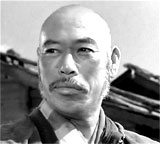
Kambei Shimada (Takashi Shimura) - the Elderly and Wise Master
|
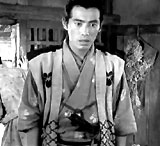
Katsushiro Okamoto (Isao Kimura) - the Disciple
|
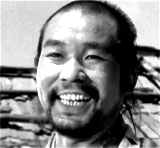
Gorobei Katayama (Yoshio Inaba) - a Good-Natured
Giant; an Expert Archer
|
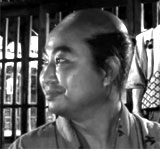
Shichirōji (Daisuke Katô) - a Round-Faced Old Friend
|
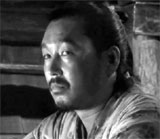
Heihachi Hayashida (Minoru Chiaki) - a Woodchopper
|
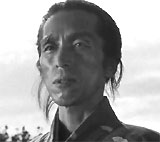
Kyūzō (Seiji Miyaguchi) - a Stoic, Quiet Swordsman
|
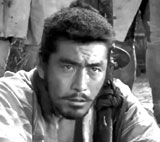
Kikuchiyo (Toshiro Mifune)
|
- in addition to six warriors in total, Kambei
- after initial strong reluctance - also accepted a burly,
wild, eccentric, annoying, amusing and arrogant Kikuchiyo (Toshiro
Mifune), an insolent 'black sheep' character who falsely claimed
he was a samurai warrior and had persistently
followed after them
- the villagers worried about the samurai who had
sometimes acquired a bad reputation for their abusive treatment
of young girls; Manzo became paranoid that his pretty young daughter
Shino (Keiko Tsushima) would be seduced and ordered her to chop
off her hair and pretend to be masculine to protect her from the
lustful samurai: ("Cut your hair and dress like a man...It's
only because I love you")
- once the group of samurai arrived in the village,
the residents did not warmly greet them, but actually cowered and
hid in their huts; however, Kikuchiyo tricked the farmers with
a false alarm about a bandit attack - and they came rushing out
begging for the samurai to save them; he rebuked the
people for groveling for protection, calling them "blockheads"
and "mud snails"; as a result Kikuchiyo was begrudgingly accepted
as the seventh samurai: ("Looks like he's good for something after
all")
- while the villagers were being trained to fight
in small squad groups with spears for an anticipated
siege, master Kambei surveyed the village with a hand-drawn map
and prepared for the strategic defense of its perimeter by flooding
some of the fields and evacuating three outlying houses that would
be impossible to protect: ("This is the nature of war: By
protecting others, you save yourself. If you only think of yourself,
you'll only destroy yourself")
- Kikuchiyo realized
that the villagers in the past had likely murdered injured, fleeing, retreating or dying samurai from
other nearby battles and taken their weapons (i.e., bamboo spears),
and he showed off traditional samurai armor and weapons from dead warriors that had been secretly
hidden ("Plunder from defeated warriors")
- Kambei and the others
were angered by the discovery, and Kikuchiyo - who was wearing
some of the samurai armor - suspected that the farmers were more
wily than they had originally thought and "playing innocent" -
he speculated that they were also hiding and hoarding their food:
("What
did ya think these farmers were anyway? Buddhas or something? Don't
make me laugh! There's no creature on earth as wily as a farmer!
Ask 'em for rice, barley, anything, and all they ever say is, 'We're
all out.' But they've got it. They've got everything. Dig under
the floorboards. If it's not there, try the barn. You'll find plenty.
Jars of rice, salt, beans, sake! Go up in the mountains. They have
hidden fields. They kowtow and lie, playing innocent the whole
time. You name it, they'll cheat you on it! After a battle, they
hunt down the losers with their spears. Listen to me! Farmers are
misers, weasels, and cry-babies! They're mean, stupid murderers!
Damn! I could laugh till I cry! But tell me this: Who turned them
into such monsters? You did! You samurai did! Damn you to hell!
In war, you burn their villages, trample their fields, steal their
food, work them like slaves, rape their women, and kill 'em if
they resist. What do you expect 'em to do? What the hell are farmers
supposed to do?")
- Kikuchiyo ranted at the other samurai, calling them responsible as a group
for oppressing the lower-class farmers for many years; he accused
them of turning the villagers into rapists, thieves, and overall
mean, stupid murderers; his emotional speech revealed his own peasant upbringing; the
sobbing Kikuchiyo sank to his knees, and swore: "Damn it!
Goddamn it!"; after a long pause, Kambei asked him: "You were born a farmer,
weren't you?" - it was a surprising revelation that Kikuchiyo wasn't a samurai
after all, but the son of a village peasant; now clearly identifying
with the plight of the villagers, he served as a symbolic bridge
between them and their samurai protectors
- meanwhile, Katsushiro had just come upon disguised
Shino (dressed like a short-haired boy) picking flowers in a field;
suspecting her, he chased after her and wrestled her down and quickly
realized she was a female; he soon began sharing food with her
in private, and a romantic affair developed
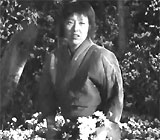
Short-Haired Shino Disguised as a Boy
|
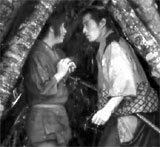
|
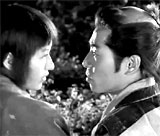
|
|
The Start of a Romance Between Shino
and Young Katsushiro
|
- Shino and Katsushiro were
about to have sex together in a field, when they were interrupted
by noise from horses of nearby bandit scouts; two were swiftly
identified and killed by Kyūzō, with Katsushiro watching,
while the third bandit was questioned and then killed by the avenging
villagers
- the bandits' fort encampment
was located a half days' ride away, and it was decided to conduct
a pre-emptive strike on it by burning it down; earlier, samurai
Heihachi had made an untimely joke about troubled and vengeful
villager Rikichi not having a wife (not knowing she had been previously
captured by the bandits and was forced into concubinage); now while
Rikichi (who accompanied the three samurai as a guide) ferociously
fought against the bandits, he briefly glimpsed his kidnapped wife
at the doorway of the burning hut; he followed her as she raced back
in; Heihachi lost his life (a musket shot in the back)
as he attempted to pull Rikichi away from the burning structure
- during the funeral ceremony for Heihachi back in
the village, as a tribute to the fallen samurai, Kikuchiyo raised
the banner-flag Heihachi had created atop one of the rooftops;
just then, the bandits appeared on the mountains behind the village
- just before the expected bandit raid, a bridge was
removed and fortifications
around the village had been strengthened, including
the construction of a moat (a flooded field) lined with high bamboo
fence-barriers so that there was only one way into the village
(Kambei: "You
can't win by defense alone")
- the climax of the film was a lengthy
3-day battle against about 40 armed bandits assaulting the village;
they first attacked and burned the outlying huts and old mill barn
across the stream, where they murdered the stubborn Old Man elder
and a young couple (with a child); Kikuchiyo self-identified with
the orphaned child that he saved ("This baby... is me! This is
just what happened to me!")
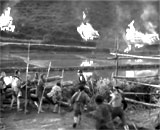
Outlying Village Homes Burned
|
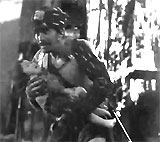
Kikuchiyo Rescuing Orphaned Baby
|
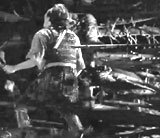
Bandit Speared in the Back
|
- during hand-to-hand combat and the use of spears
by the villagers, several of the bandits were killed attempting
to scale the barricades or cross the moats; the smart strategy
of the samurai was to allow only a few bandits (in the cavalry)
to enter into the village on horseback through a small gap or entryway
- before surrounding and ambushing them one-by-one; Kambei kept
an accurate count of the killed bandits with a chart marked with X's
- Kikuchiyo unwisely abandoned his post to steal a
second musket (to receive praise like Kyuzo had earlier), but unexpectedly,
Kambei chastised him: "There's nothing heroic about selfishly
grabbing for glory...War is not fought alone"; Kikuchiyo's
absence had allowed a breach in the fortifications and more villagers
died; Gorobei was also slain (off-screen) at his post (it was the
second of four samurai casualties)
- Kambei knew that the third
and last day of fighting would be
a showdown and "a fight to the finish"; realizing that they
might die, Shino encouraged Katsushiro to have sex with her, but then
they were embarrassed after being caught by her father Manzo, who beat
her and called her a "tramp," "wench," a "slut" and
"damaged goods";
Shichirōji
reasoned with the enraged father: "On the eve of decisive battles,
this often happens... You can't blame them...What's wrong with two
people in love? It's not like bandits took her!"
- during the rain-soaked
last day of fighting in the mud during torrential downpours against
the remaining 13 bandits, Kyuzo with his sword drawn outside was
shot in the back by the dishonorable Bandit Chief hiding in the
woman's hut; the fourth and final samurai casualty was Kikuchiyo
who was charging into the hut to avenge Kyuzo's death when he was
shot in the abdomen; he briefly revived and retaliated against
the bandit chief by skewering him with his sword before dying of
his own lethal wounds; the remaining bandits were defeated
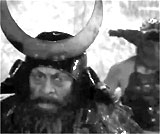
Bandit Chief Entering Women's Hut
|
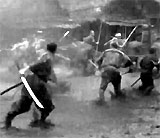
Kyuzo With Sword Just Before Being Shot Dead In Muddy Courtyard
|
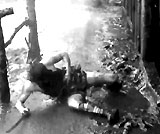
Kikuchiyo Lethally Shot in the Abdomen
|
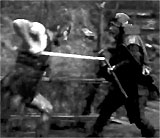
Kikuchiyo's Killing of the Bandit Chief Before Expiring
Himself
|
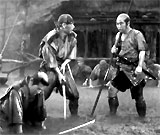
The Three Surviving Samurai ("Once more we
survive"): Katsushiro, Kambei, Shichirōji
|
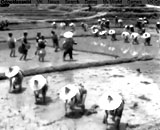
The Farmers Again at Peace, Planting Rice in Fields
|
- the final scene was of the farmers finally at peace
again - planting their next crop of rice as they happily sang and
played rhythmic music; Katsushirō and
Shino briefly stared at each other before she passed by him to continue
her field work - due to their class differences, their relationship
was destined to be over
- the ending shot was of the three viewing
the graves or funeral mounds of their four dead comrades (each
with a samurai sword sticking out), above the graves of the fallen
villagers, with Kambei's words to Shichirōji about how the
victory belonged to the farmers, but not to the samurai: "In
the end, we lost this battle too...I mean, the victory belongs
to those peasants. Not to us"
|
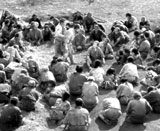
Village's Circle Meeting and Discussion: What Should
Be Done About the Bandits?
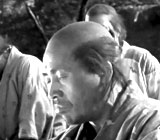
The Opinion of Older Farmer Manzo: Submit Meekly
to the Bandits and Don't Fight Back
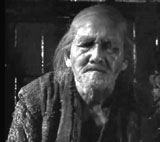
The Old Man Gisaku's Suggestion: Hire Hungry Samurai To Protect the Village
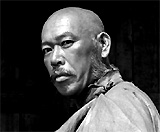
Samurai Kambei Shimada - With Shaved Head and Wearing
Monk's Robe - a Cunning Ploy to Save a Child Hostage
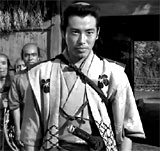
Kambei's Aspiring Disciple-Acolyte Katsushiro
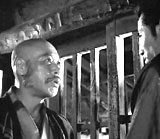
When Kambei Was Asked to Help Defend the Villagers - He
Responded: "This isn't a game"
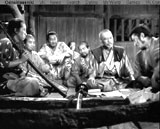
The Group of Seven Samurai

Villager Manzo's Pretty Daughter Shino (Keiko Tsushima)
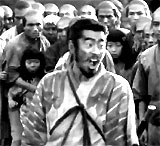
Kikuchiyo
Rebuking the Fearful Villagers For Groveling For Protection
From the Samurai After a False Bandit Alarm
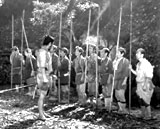
Training the Villagers to Defend Themselves

Kikuchiyo - Wearing Armor Taken from Dead Samurai by the
Wily Farmers - His Lengthy Denunciation of the Samurai
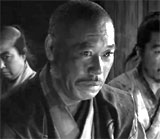
Kambei's Insightful Question to Kikuchiyo: ("You were born a farmer,
weren't you?")
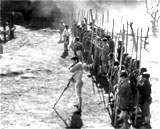
Preparations for the Coming War
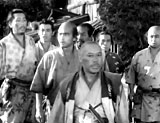
The Seven Samurai Alerting the Village to Presence of Bandit Scouts
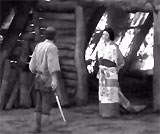
Rikichi Noticing Kidnapped Wife at Bandit Camp
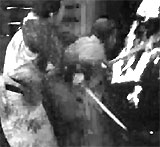
Heihachi Attempting to Pull
Rikichi Back Before His Own Death
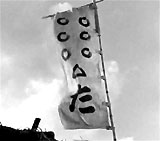
Banner-Flag Raised in Tribute by Kikuchiyo for Heihachi
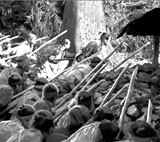
The Villagers Readied with Spears at One of the Main Entrances

X's Represented Dead Bandits
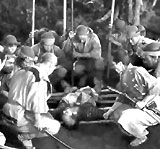
Gorobei Slain (Off-Screen)
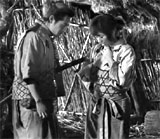
Shino and Katsushiro Embarrassed For Being Caught By Her Father, After
Having Sex
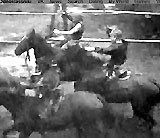
Last Day's Rain-Soaked Battle Between Villagers (and Samurai)
and the Bandits on Horseback

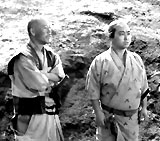
Kambei to Shichirōji: "In the end, we lost this battle
too"

The Graves or Funeral Mounds of Four Dead Samurai Behind
Graves of Villagers - Viewed by Samurai Survivors
|


























